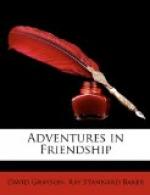“David,” Harriet whispered, “did you see the baby?”
“No,” I whispered.
“I think it’s the finest baby I ever saw in my life.”
When I was a boy, and my great-aunt, who lived for many years in a little room with dormer windows at the top of my father’s house, used to tell me stories (the best I ever heard), I was never content with the endings of them. “What happened next?” I remember asking a hundred times; and if I did not ask the question aloud it arose at least in my own mind.
If I were writing fiction I might go on almost indefinitely with the story of Anna; but in real life stories have a curious way of coming to quick fruition, and withering away after having cast the seeds of their immortality.
“Did you see the baby?” Harriet had asked. She said no word about Anna: a BABY had come into the world. Already the present was beginning to draw the charitable curtains of its forgetfulness across this simple drama; already Harriet and Anna and all the rest of us were beginning to look to the “finest baby we ever saw in all our lives.”
I might, indeed, go into the character of Anna and the whys and wherefores of her story; but there is curiously little that is strange or unusual about it. It was just Life. A few days with us worked miraculous changes in the girl; like some stray kitten brought in crying from the cold, she curled herself up comfortably there in our home, purring her contentment. She was not in the least a tragic figure: though down deep under the curves and dimples of youth there was something finally resistant, or obstinate, or defiant—which kept its counsel regarding the past.
It is curious how acquaintanceship mitigates our judgments. We classify strangers into whose careers the newspapers or our friends give us glimpses as “bad” or “good”; we separate humanity into inevitable goathood and sheephood. But upon closer acquaintance a man comes to be not bad, but Ebenezer Smith or J. Henry Jones; and a woman is not good, but Nellie Morgan or Mrs. Arthur Cadwalader. Take it in our own cases. Some people, knowing just a little about us, might call us pretty good people; but we know that down in our hearts lurk the possibilities (if not the actual accomplishment) of all sorts of things not at all good. We are exceedingly charitable persons—toward ourselves. And thus we let other people live!
The other day, at Harriet’s suggestion, I drove to town by the upper road, passing the Williams place. The old lady has a passion for hollyhocks. A ragged row of them borders the dilapidated picket fence behind which, crowding up to the sociable road, stands the house. As I drive that way it always seems to look out at me like some half-earnest worker, inviting a chat about the weather or the county fair; hence, probably, its good-natured dilapidation. At the gate I heard a voice, and a boy about three years old, in a soiled gingham apron, a sturdy, blue-eyed little chap, whose face was still eloquent of his recent breakfast, came running to meet me. I stopped the mare. A moment later a woman was at the gate between the rows of hollyhocks; when she saw me she began hastily to roll down her sleeves.




